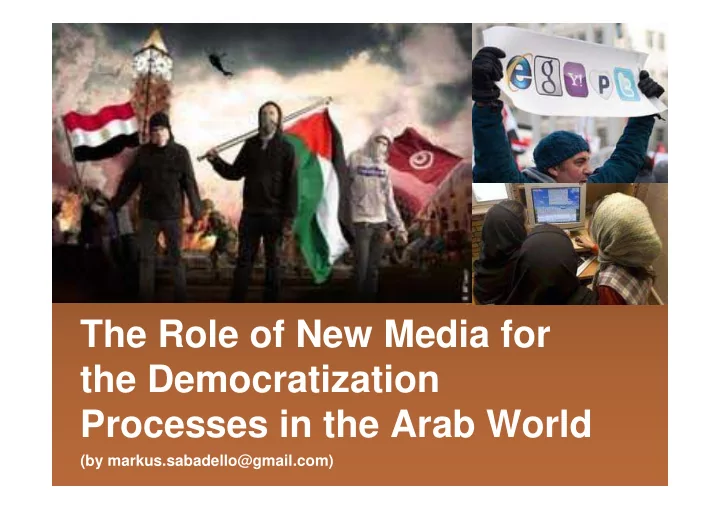

The Role of New Media for the Democratization Processes in the Arab World (by markus.sabadello@gmail.com)
Overview 1. Introduction General overview on the use of new media for Peace & Conflict. The role of new media in democratization processes. 2. Case Studies: Tunisia, Egypt, others How was new media used in the revolutions? What role did counter-measures play? 3. Western involvement Support for activists. New media as new diplomacy. 4. Assessment, outlook and discussion How useful is new media for democratization processes? What are the issues that need to be addressed?
Part 1: Introduction (by markus.sabadello@gmail.com)
New Media for Peace&Conflict • Education, Knowledge • Development cooperation • Intercultural dialogue • Cyberwarfare, cybercrime, cyberterrorism • Propaganda • As a weapon in (nonviolent) conflict – Organization of a movement, recruiting of new members, political outreach – Protest&Persuasion, Noncooperation, Intervention • As a weapon by authoritarian regimes • For democracy after a revolution
Introduction • „Twitter Revolutions“ ? • Role of social networks ?
Introduction • Revolutions yesterday and today? 1989 2011 ?
Introduction • 1994: EZLN uprising • 2000: Serbian Otpor! • 2008: Anti-FARC marches
Introduction Source: Arab Social Media Report Vol. 1, No. 2
Introduction Source: Arab Social Media Report Vol. 1, No. 2
Introduction Source: Arab Social Media Report Vol. 1, No. 2
Part 2: Case Studies: Tunisia, Egypt, others (by markus.sabadello@gmail.com)
Case Study: Tunisia • Unemployment, civil liberties, corruption • Self-Immolation of Mohamed Bouazizi on Dec 17, 2010 • President Ben Ali resigned on Jan 14, 2011 • Freedom of speech promised and partially implemented
Case Study: Tunisia • Facebook and Youtube used to spread images of riots in Sidi Bouzid "Let's hope that this event in Sidi Bouzid isn't limited to Bouazizi's health ... this is only the beginning!!! @youtor_KHAN via Twitter
Case Study: Tunisia • Nhar 3la 3ammar (“Day of Ammar”) – Anti-Censorship rally
Case Study: Tunisia Source: Arab Social Media Report Vol. 1, No. 2
Case Study: Tunisia • State oppression: – Tight control of traditional media – Censorship of Youtube, Wikileaks, human rights web sites, activists blogs – Bloggers threatened and imprisoned • Slim Amamou and Azyz Amamy – Phishing, hacking of passwords • "Here we don't really have Internet, we have a national Intranet.“ Azyz Amamy, Tunisian web activist
Case Study: Tunisia • Use of the Tor anonymizing network
Case Study: Egypt • Inspired by Tunisia Revolution • Death of Khaled Mohamed Saeed • Uprising on Jan 25, 2011 • Mubarak resigned on Feb 11, 2011
Case Study: Egypt • „We are all Khaled Said“ • #jan25 Twitter hashtag
Case Study: Egypt • April 6 Youth Movement
Case Study: Egypt • Google executive and political activist Wael Ghonim • Symbolic leader for protesters
Case Study: Egypt • Jan 27, 2011: Complete shutdown of international Internet connections Source: http://www.renesys.com/blog/2011/01/egypt-leaves-the-internet.shtml
Case Study: Egypt Source: Arab Social Media Report Vol. 1, No. 2
Case Study: Egypt “If your government shuts down your Internet, it’s time to shut down your government.” - Message found on social networks during the Egypt revolution “We had no freedom of assembly in the streets of Cairo, so we assembled in cyberspace instead.” - Comment by a leading Egyptian technologist and activist
More Case Studies • Libya • Feb 15, 2011 civil war • Internet shutdown • Mohammed Nabbous – blogger and journalist – founder of first private TV station in rebel territory – killed by loyalist sniper on Mar 19, 2011 in Benghazi
More Case Studies • Iran‘s Green Movement • Jun 12, 2009 presidential elections – Facebook and news sites censored – Cell phone service shut down – Large support by diaspora, e.g. proxy servers – Counter propaganda on social networks – Police crackdown on movement „The government turned to the Internet to identify their real opponents.“ Yevgeny Morozov http://www.youtube.com/watch?v=glSIoRrMr1g
More Case Studies • Moldova • Apr 5, 2009 parliamentary elections – #pman Twitter hashtag to organize protests – Cellphone service turned off on main square
More Case Studies • Belarus • Dec 19, 2010 presidential elections – DDoS attacks against opposition websites – Filtering of port 443 on international traffic • Jul 3, 2011 independence day – Protests organized through VKontakte
Part 3: Western Involvement (by markus.sabadello@gmail.com)
Western Involvement • Long-time European support for dictators • For stability, and to fight terrorism???
Western Involvement • Internet censorship software – Tunisia: SmartFilter software by McAfee • Hacktivism – Tunisia: „Anonymous“ DDoS attacks on president, prime minister, the ministry of industry, the ministry of foreign affairs, and the stock exchange • Egyptians trained by Otpor! – Center for Applied NonViolent Action and Strategies • U.S. financial support
Western Involvement • Blogging platform „Global Voices“ – Bridgeblogging between cultures and languages – By Harvard Berkman Center • Internet access – Egypt: xs4all, speak2tweet – Iran: Cooperation between US State Department and Twitter to ensure service – New America Foundation • „Twitter Diplomacy“ – Clinton‘s speech on Internet Freedom
Part 4: Assessment, outlook and discussion (by markus.sabadello@gmail.com)
Barriers & Outlook • Digital Divide • Human Rights – Access to information, Freedom of Expression, Privacy • Architectures – Decentralization – Anonymizing P2P
Assessment and Discussion • Would the revolutions have happened without Facebook, Twitter, Youtube, etc.? • How useful is new media for democratization processes? • The revolution was successful. What now?
Sources http://cpj.org/internet/2011/01/tunisia-invades-censors-facebook-other-accounts.php http://www.rferl.org/content/belarus_oppositon_websites_hijacked/2253038.html http://neteffect.foreignpolicy.com/posts/2009/04/07/moldovas_twitter_revolution http://www.opednews.com/articles/How-Facebook-Helped-Fell-t-by-Tawnia-Sanford-Amm-110115-765.html http://english.aljazeera.net/indepth/opinion/2011/01/201111410250537313.html http://cpj.org/internet/2011/01/tunisia-invades-censors-facebook-other-accounts.php http://www.thetechherald.com/article.php/201101/6651/Tunisian-government-harvesting-usernames-and-passwords http://english.aljazeera.net/indepth/features/2011/01/20111614145839362.html http://www.rferl.org/content/tunisia_can_we_please_stop_talking_about_twitter_revolutions/2277052.html http://jilliancyork.com/2011/01/14/not-twitter-not-wikileaks-a-human-revolution/ http://www.foreignpolicy.com/articles/2011/01/14/the_first_twitter_revolution?page=full http://techliberation.com/2011/01/04/evgeny-morozov-on-the-dark-side-of-internet-freedom/ http://www.renesys.com/blog/2011/01/egypt-leaves-the-internet.shtml http://www.telegraph.co.uk/news/worldnews/africaandindianocean/egypt/8288163/How-Egypt-shut-down-the- internet.html http://ignitenews.mohawkcollege.ca/1658/tech/the-twitter-revolution/ http://www.nonviolent-conflict.org/index.php/learning-and-resources/resources-on-nonviolent- conflict?bTask=bDetails&bId=342
Recommend
More recommend